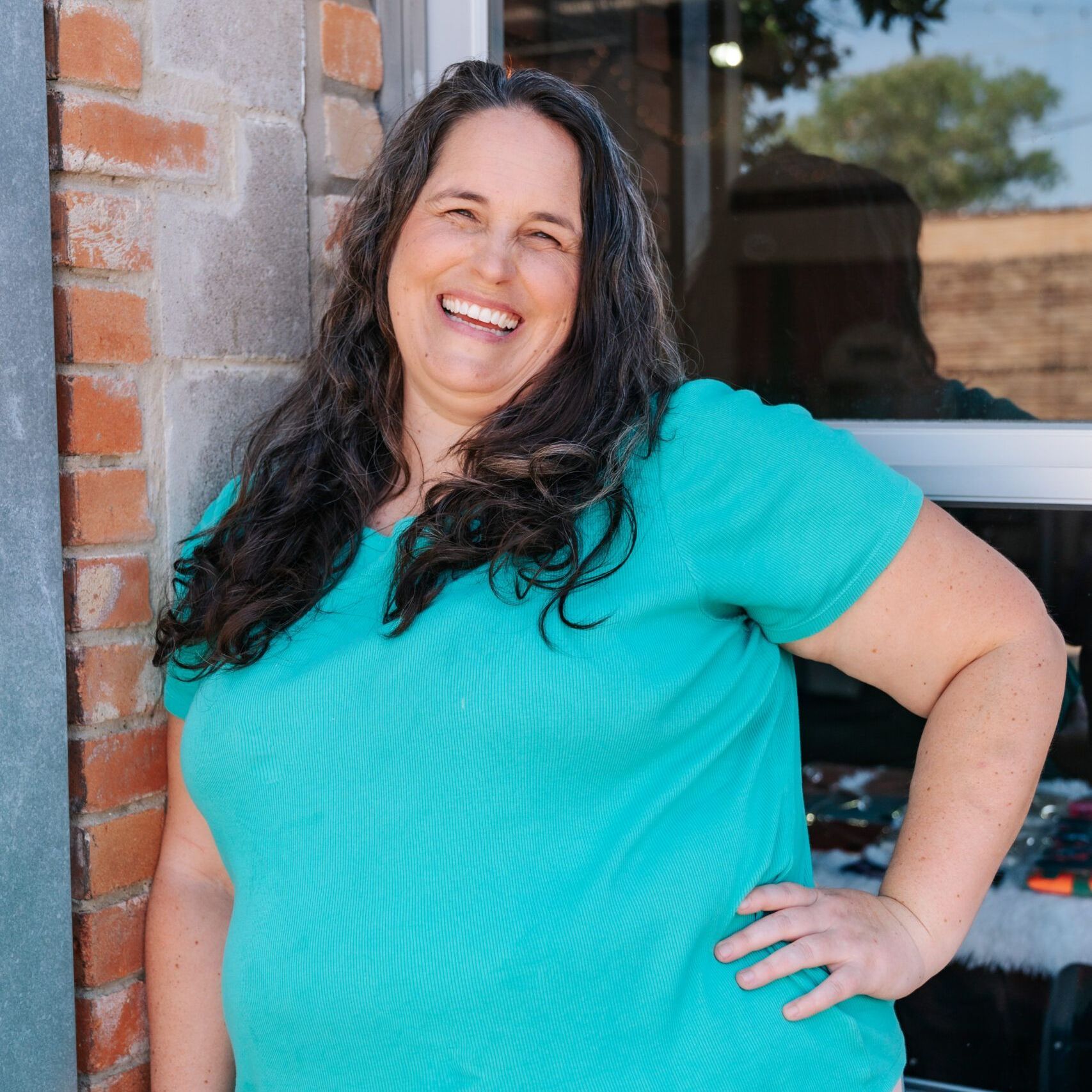Connecting With Your Teen Makes Parenting Easier

I remember thinking that raising my kids during the teen years was going to be so much different than what it was like raising them when they were little. That somehow their core needs were going to magically shift, and I would be completely powerless, not knowing what to do next.
All I could hear were voices from other parents in my head. “Oh, you think it’s hard now, wait until they are teenagers,” or “the teenage years are the worst.” The funny thing was, every stage was like that. People would lament about how hard babies, then toddlers, then elementary school kids were, and then onto the tween and teen years.
But when my oldest was around 9, I fully transitioned my parenting style from a power-over approach to a power-with style. And then the teen years came for my oldest, and all the hard and bad things that were spoken about parenting him never came.
Sure, there are big emotions, misunderstandings, and hard times. But it hasn’t become unmanageable. And while I am still in the thick of it, as a parenting coach and a mom, I started to recognize that the key to our relationship truly has been the connection.
Would it ever feel easy?
I can’t say that I’ve cracked the “easy” code, but I can say that over the years, I have leaned into a process of transformation to shed the lies that have been spoken to me about parenting. Yes, it’s hard. It’s not hard, though, because of the children, but because of the adults and their expectations of the children.
Many of us were taught parenting skills that focused on obedience and correction, not on parent-led connection and emotional regulation. And when it came down to it, these power-over methods of gaining kids' compliance would somehow “work” temporarily, but at what cost? Lost connection, kids struggling with emotions, shut downs, meltdowns, and feeling completely at a loss for what to do next.
The good news is that although teens are older, they still have the exact same core needs as your little ones. According to Dr. Dan Siegel in the book
The Power of Showing Up, kids have four core needs. They need to feel safe. They need to feel seen. They need to feel soothed. And they need to feel secure. This type of connection is
what is necessary to create healthy, long-term bonds with your child.
Teens Still Need Safety
Safety is such an innate need that it starts to form from the moment you first hold your newborn in your arms and kiss their gooey heads, all the way into the teen and adult years. Safety helps to form the foundation for a healthy attachment. And at any stage of development, you can work to establish this safety in your relationship with your child.
And this safety doesn’t just look like keeping your kids out of the road or stopping them from climbing trees too high. Safety is also evident in how you, as a parent, show up to not only protect them from outside harm, but also in how you actively avoid being the one causing the harm.
You don’t need to go full-on helicopter parent to offer safety, but being aware is pretty important. Are you blowing up when they get mad? Are you criticizing them and pushing them away? Are you noticing mental health cues that could be signs of something deeper?
As teens grow, they still need protection from harmful things. This can look like giving them their first smartphones with age-appropriate filters turned on, alongside modeling good habits.
You can teach and model emotional regulation, and also teach them about tricky people online and online scams. Safety can also look like standing up for them at school if they are being bullied, and so much more.
Are you willing to protect them from movies that aren’t age-appropriate? It can look like being thoughtful of who you leave them alone with and
listening to them when they express feeling uncomfortable around certain people. It can look like not blowing up when they make a mistake, but instead offering compassion, connection, and a collaborative solution for moving forward.
Slow Down to See Your Teen
Teen life can get really busy. From homework assignments to ball games and dance recitals, you may sometimes feel like the only time you get with your teenager is in the car driving them to and from events. And when you’re home, the focus is often on chores and other essentials.
I’ve discovered that slowing down helps me to see my teen. Dr. Dan Siegel discusses a “triad” of connection that includes perceiving, making sense, and then responding. This helps teens to experience the feeling of being seen in various situations.
An example for teens might be when they are home past curfew. Implementing this approach may look more like listening and considering their side of things before jumping to correcting them and taking away a privilege. Maybe they lost track of time. Perhaps they were reliant on a friend for a ride. Maybe they had a flat tire on the way home. Maybe their phone died and they couldn’t call.
Hearing them out and taking the time to process that information can help you better understand and connect. Next, you can take a collaborative approach with them to come up with what to do next time. Brainstorm how they can communicate with you to let you know what’s going on if they are going to be late.
When kids don’t feel seen, there is an internal sense that they have parents who just don’t get them. This can create an even bigger chasm and disconnection during the years when they still need your guidance.
Soothing a Teen
By the teen years, it’s less likely that you are going to pick up your teen and hold them close like you did when they were a baby. But that doesn’t mean that they don’t need your calm presence.
As a Jai coach, I got to learn the importance of regulating my own emotions in different ways. This helps me show up for my kids as a calming force, no matter what age they are. Just because they are struggling to manage hard feelings doesn’t mean I have to as well.
Soothing a teen requires shifting how we communicate with them when we hold a boundary or they experience distress. An example would be after a big baseball game, their team lost because of a mistake they made, and they are feeling down about it. Instead of being dismissive of their feelings, you could try leaning into the discomfort.
It means switching from a language that says “it was just a game” to a language that acknowledges how they feel and gives them space to process it.
“I can see you’re pretty upset. Do you want to talk about what happened?”
“Yeah, I saw it. I noticed your body language shifted when you realized what happened. Did you have any specific thoughts that came up for you?”
“Are those thoughts true?” “I am here for you. I know how hard you practiced. I can see how disappointed you are.”
You’re not putting any judgment value to say that it was bad or that they screwed up or even that you are disappointed with the outcome.
Your calm, non-judgmental presence offers a safe space for those tough feelings to be soothed. Of course, you can offer a hug, a tissue, or whatever your teen needs as well. But staying present with them can offer immense value to the connection you share with your teen.
Putting it all Together
All of these ways to connect with your teen ultimately can create a sense of security. Your teenager not only feels safe in your presence, but they also feel secure in the relationship they have with you. And this secure space is the space where their confidence soars, so they can start dipping their toes into the real world.
You become the launchpad for their greatest successes and their hardest moments. But they know that no matter what happens, they can always feel connected and welcome in your presence.
So no, parenting a teen isn’t necessarily easy. But it also doesn’t have to be painfully hard. When we focus on creating healthy connections in various ways, we show our teens that no matter what challenges they face, we are their parents and we will always be there for them.
Whether they need to feel safe, seen, soothed, or secure in your presence, the good news is that it’s never really too late to start.
Meet Your Author, Kristi Crosson
Kristi Crosson is a Jai Certified Transformational Parenting Coach who began her shift from authoritarian parenting when her oldest was nine, and her family has been forever changed. With 15+ years of ministry experience with teens and tweens, a Biology degree, a deep love of learning, and a passion for helping others, Kristi blends her Christian faith with the latest in developmental science. She now helps moms release old parenting patterns and embrace a connected, “power with” approach to raising emotionally and spiritually healthy kids.
Business Name: Kristi Crosson – Parenting Coach
Website: www.kristicrosson.com
Instagram:
www.instagram.com/becomingthegentleparent
Share This Article:
Curious for more?














